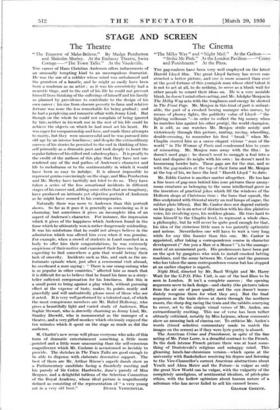"The Emperor of Make-Believe." By Madge Pemberton
STAGE AND SCREEN The Theatre
and Malcolm Morley. At the Embassy Theatre, Swiss Cottage—" The Town Talks." At the Vaudeville. THE career of Hans Christian Andersen offers inducements of an unusually tempting kind to an unscrupulous dramatist. lie was the son of a cobbler whose mind was unbalanced and the grandson of a lunatic, and he might as easily have been born a madman as an artist ; as it was his eccentricity had a neurotic tinge, and to the end of his life he could not prevent himself from thinking of the sufferings of himself and his family as planned by providence to contribute to the design of his own career ; his rise from obscure poverty to fame and relative fortune was none the less remarkable for being gradual ; and he had a perplexing and romantic affair with Jenny Lind. But though on the whole he could not complain of being ignored by fate, neither in his work nor in the rest of his life could he achieve the objects on which he had most set his heart. He was eager for companionship and love, and made three attempts to marry, but they were unsuccessful and he was pursued into old age by an intense loneliness; and despite the extraordinary success of his stories he persisted to the end in thinking of him- self primarily as a dramatic poet and took deeply to heart the regular failures of his stilted and valueless plays. It is greatly to the credit of the authors of this play that they have not sur- rendered any of the real pathos of Andersen's character and life to melodrama or to the sentimentality in which it would have been so easy to indulge. It is almost impossible to represent genius convincingly on the stage, and Miss Pemberton and Mr. Morley have tactfully not tried to do so. They have taken a series of the less sensational incidents in different stages of his career and, adding some others that are imaginary, have produced an intimate yet objective portrait of Andersen as he might have seemed to his contemporaries.
Naturally there was more to Andersen than this portrait shows. So far as it goes it is generally as convincing as it is charming, but sometimes it gives an incomplete idea of an aspect of Andersen's character. For instance, the impression which it gives of the happiness which Andersen found in the fame which he ultimately won is rather dangerously misleading. It was his misfortune that he could not always believe in the admiration which was offered him even when it was genuine. For example, when a crowd of students in Lund marched in a body to offer him their congratulations, he was extremely suspicious of their motive and examined their faces one by one, expecting to find somewhere a grin that would betray their lack of sincerity. Incidents such as this, and such as the un- fortunate episode when, just after a ceremonial visit abroad, he overheard a man saying : " There is our orang-outang who is so popular in other countries," affected him so much that it is difficult for us to believe that he found his fame as a story teller sufficient compensation for his loneliness. But this is a small point to bring against a play which, without pursuing effect at the expense of taste, makes its points neatly and gracefully and will undoubtedly please most of those who see it acted. It is very well performed by a talented east, of which the most conspicuous members are Mr. Baliol Holloway, who gives a beautiffilly light and varied study of Andersen, Miss Sophie Stewart, who is shrewdly charming as Jenny Lind, Mr. Stanley Drewitt, who is monumental as the manager of a theatre, and a very gifted monkey which obviously enjoyed the ten minutes which it spent on the stage as much as did the audience.
M. Chariot's new revue will please everyone who asks of this form of dramatic entertainment something a little more .pointed and a little more unassuming than the self-conscious magnificence which Mr. Cochran is accustomed so lavishly to provide. The sketches in The Town Talks are good enough to be able to dispense with elaborate decorative support. The best of them are Mr. Arthur Riscoe's superb dumb show as a Parliamentary candidate facing a disorderly meeting and his parody of Sir Cedric Hardwicke, June's parody of Miss Bergner, and a delightful tableau of the Selection Committee of the Royal Academy, whose ideal picture is magnificently defined as consisting of the representation of " a very young


































































 Previous page
Previous page